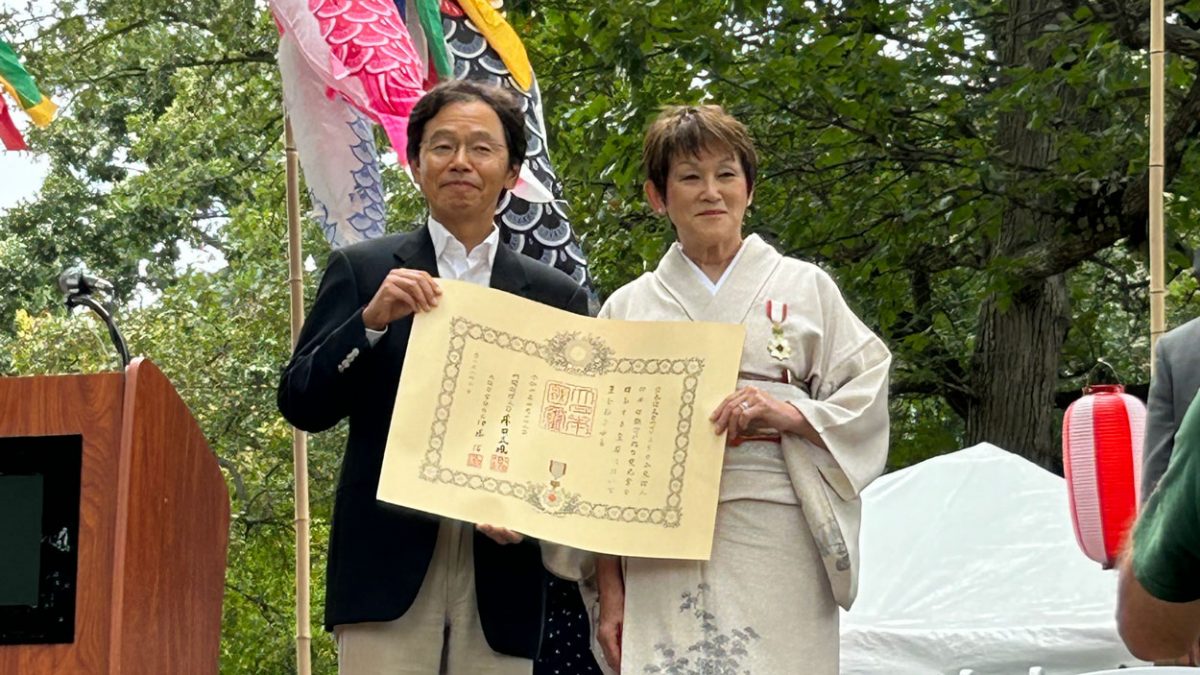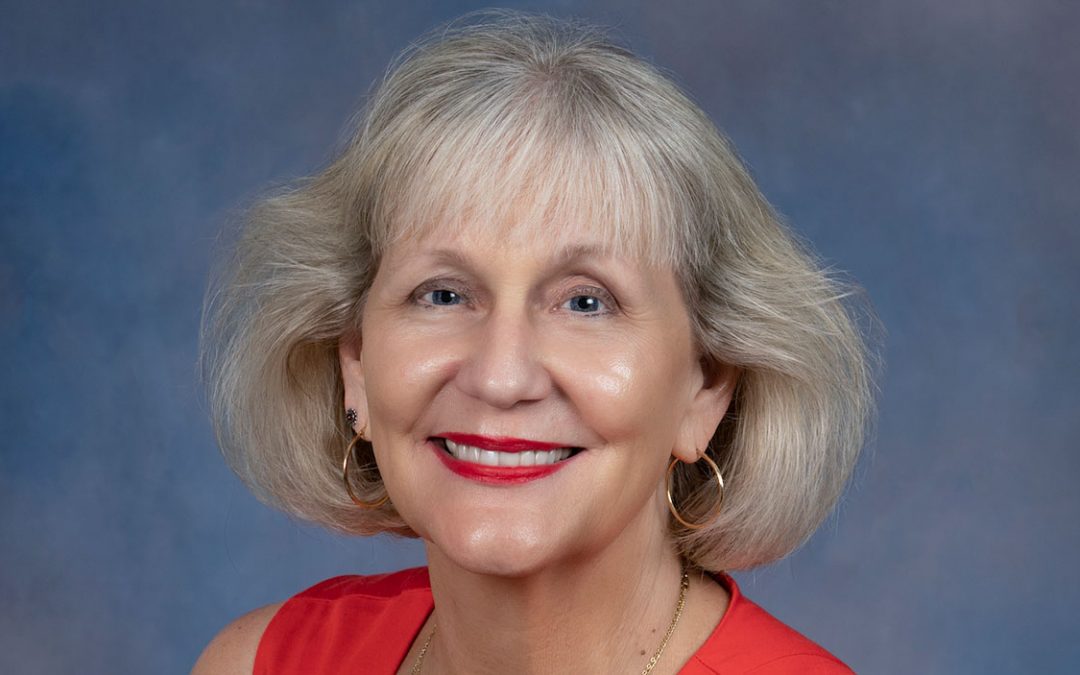
Chikako Usui, an associate professor emerita, was presented with the Order of the Rising Sun, Gold and Silver Rays from the Japanese government at the Japanese Festival at the Missouri Botanical Garden earlier this year. (Photo courtesy of Chikako Usui)
Ever since she first arrived in the United States in 1976, people have been asking Chikako Usui about Japan.
Although Usui grew up in Japan, she found herself needing to do some research to answer those questions. As a college professor – she started teaching sociology at the University of Missouri–St. Louis in 1991 – she felt responsible for sharing correct, up-to-date information. Having earned her PhD from Stanford University in 1988, she leaned on her background in comparative sociology, which gave her a framework to examine differences in social structure between the U.S. and Japan.
“Even though I was born and raised in Japan, my real education about Japan began since I came to the United States,” she said. “I really enjoyed working and learning with these two countries’ issues – business issues, cultural issues, family issues, educational issues. There is continuing interest people have – more recently, it’s about the Japanese popularity of anime, manga or sushi – and people ask these fundamental questions. As a sociologist, I have always had the desire to better understand and better answer those questions at the academic level and at the public level.”
Now an associate professor emerita, Usui taught at UMSL for over 30 years, during which she has played a pivotal role in increasing Japanese cultural awareness in her adopted hometown of St. Louis. On April 29, the Japanese government recognized Usui and her decades-long commitment to strengthening relations between the U.S. and Japan when she was selected as a recipient of the Order of the Rising Sun, Gold and Silver Rays.
This honor, which is conferred by His Majesty the Emperor of Japan, Naruhito, was established in 1875 and is one of the highest honors given by the Japanese government. Usui was formally presented with the award at the Japanese Festival hosted at the Missouri Botanical Garden in late August.
“It’s a very prestigious honor for me to receive this as an individual, being recognized for what I have done to bridge these two countries and promoting better understanding of two countries contributing to increased friendship exchanges among young people,” Usui said. “I was quite surprised when I was notified.”
Much of Usui’s work building Japanese cultural awareness in St. Louis has been carried out through the Japan America Society of St. Louis, a completely volunteer-run nonprofit organization housed at UMSL that aims to promote better understanding between the people of Japan and the U.S. When Usui first arrived at UMSL in 1991, she worked as a fellow at the Center for International Studies – now known as UMSL Global – where she was encouraged to develop comparative studies and started volunteering for the Japan America Society of St. Louis.
In 2008, Usui became president of the society and set about revitalizing it. She recruited new talent to the board, trained student office assistants and expanded opportunities for volunteers in Japan-related programs, including young students. She also leaned on her academic background to start applying for grants – during her 10 years as president, she brought in over $200,000 in grant funding to improve ongoing programs and start new initiatives.
This money allowed the society to greatly expand its services, assisting local libraries, schools, museums and other organizations with translation services, lectures and authentic cultural activities and demonstrations, including a Japanese tea ceremony, ikebana workshops and kimono and yukata lessons. Perhaps most importantly, the funding allowed the society to offer many of these services to the community free of charge.
In addition to expanding public education programs across St. Louis – each year, the organization receives anywhere from 50 to 100 inquiries about Japan – Usui acquired grant funding to build a youth exchange program from scratch. From 2013 to 2016, the St. Louis-Ishinomaki Friendship Program hosted 11 Japanese students between the ages of 12 and 17 in St. Louis and took 11 American students in the same age group to Ishinomaki, which was hit with a devastating earthquake and tsunami in 2011. Usui said the program has had a lasting impact – one local student who went through the program in 2014 lives and works in Japan today, another attended graduate school in Japan, and yet another visits their host family often.
“It’s a very good way of deepening people’s understanding about the history of Japan and Japanese Americans in the St. Louis region but also touching these young people’s lives through this youth exchange,” Usui said. “I realized that among many programs we did, youth exchanges probably have more visible lasting impact because these are very young people, and their lives are really shaped. Their lives were touched in many profound ways, and I realized how important it is to have a youth exchange if we want to have better understanding of one another at a people-to-people level.”
Usui stepped down as president of the society in 2019, but she’s continued to play an active role in its grassroots work across St. Louis as chairman. In addition to assisting local organizations with any requests, the society works closely with the Missouri Botanical Garden to coordinate programing at its annual Japanese Festival, which is one of the oldest and largest Japanese festivals in the U.S.
From the middle and high school students who were able to travel to Japan to the St. Louisans who line up for the Japanese Festival every year, Usui knows the impact of the Japan America Society of St. Louis is far reaching, and she’s grateful for the role that UMSL has played in allowing the society to do that important work.
“We’re very thankful for UMSL to house this organization as part of a cultural center because it gave us stability,” she said. “We didn’t have to worry about our office location or the actual building where we had to be housed. I think that we were fortunate to be well located in a place that received visibility and legitimacy. The impact is quite large, and the visibility of our society has increased over time. There are 37 Japan America societies in the United States, and the reason for the U.S. to have such an enduring friendship with Japan definitely has to do with all these grassroots organizations that involve people in different cities and towns, hosting and enjoying these kinds of programs.”














